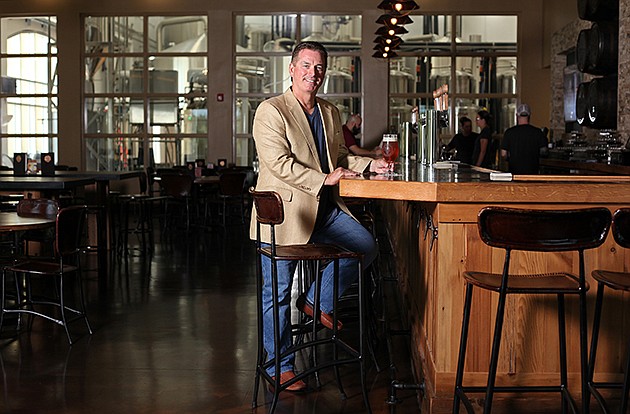- November 24, 2024
-
-
Loading

Loading

Talk about a career reversal: Tim Schoen used to manage the Budweiser brand for Anheuser-Busch. Now he helps small brewers take market share from national behemoths that dominate beer sales.
Schoen, 56, is CEO of Brew Hub. The company partners with craft beer makers that want to expand without incurring large capital expenses. California billionaire Ron Burkle's private equity firm, The Yucaipa Cos., backs Brew Hub, with an expected investment of at least $100 million.
The first of five planned Brew Hub facilities nationwide opened last year in Lakeland. The 63,000-square-foot building along Interstate 4 stands out because its design includes a two-story bottle and giant bottle caps displaying logos of partner brewers.
The partner-brewing concept, Schoen says, sets Brew Hub apart. Other companies do contract brewing, but those arrangements are sometimes secretive and short term.
Brew Hub makes money in three ways: brewing beer for its clients-partners; non-brewing management and other services; and sales of its three house-made beer brands. Brew Hub, in return, provides contracts that last at least three years, and it promotes partner brands in media and on its building. Brewmasters from partner companies can supervise production onsite or monitor every step of the brewing process remotely through digital tools. “The partners are us, and we are the partners,” Schoen says.
Larger partners, such as Tampa's Cigar City Brewing and Toppling Goliath Brewing Co. of Decorah, Iowa, use Brew Hub exclusively for brewing and packaging.
For newer brands, Brew Hub can handle all phases of business, from licensing to lining up distributors and promotion. That's the case with Golf Beer, three brews marketed by PGA tour members Graeme McDowell, Keegan Bradley and Freddie Jacobson. Other partners include Orange Blossom Brewing Co. of Orlando, Green Man Brewery of Asheville, N.C., and BJ's Restaurants of Huntington Beach, Calif.
Orange Blossom's Tom Moench loves the partnership concept. He says he used four contract brewers over the last eight years, and while he had a good relationship with the last one, he's glad he switched to Brew Hub. Benefits, he says, include superior brewing technology, better quality control and increased capacity.
Moench says he was capped at 2,500 barrels a year under contract brewing. At Brew Hub, he is on track to produce 7,000 barrels this year: “Now that we've nearly tripled it,” he says, “the company is firmly in the black and the sky is blue above me.”
The partner-brewing concept started to ferment two decades ago, when Schoen led a team researching craft brewers in the Pacific Northwest for Anheuser-Busch. After he witnessed the depth of passion by brewpub customers, Schoen realized if small brewers could overcome distribution and retail hurdles, “it could become a national phenomenon.”
Since that 1995 project, craft beer has grown from a 1% share of the U.S. market to 11%, Schoen says. It's projected to reach a 20% share by 2019, he adds.
While it seems the timing was right when Schoen's team started planning Brew Hub in 2012, he admits to some miscalculations: The canning and bottling machines the business bought weren't big enough to handle the load, for one. The can line is about to be replaced, and the original bottling line still sits on the loading dock. “It's a good problem,” he says, “but a big one.”
A second Brew Hub location — each of the five is projected to cost $20 million — is expected to start construction this summer in St. Louis, where Schoen lives. Brew Hub is scouting three more locations in the Northeast, Texas and California/Nevada, with the aim of locating within 350 miles of 75% of U.S. craft drinkers, Schoen says.
Florida was selected for the initial site, he says, because it had the lowest craft beer share but the fastest growth rate among the three biggest beer states - only Californians and Texans consume more beer. The Lakeland location includes a 150-seat tasting room. Says Schoen: “The key is our tagline: Where craft brewers go to grow.”